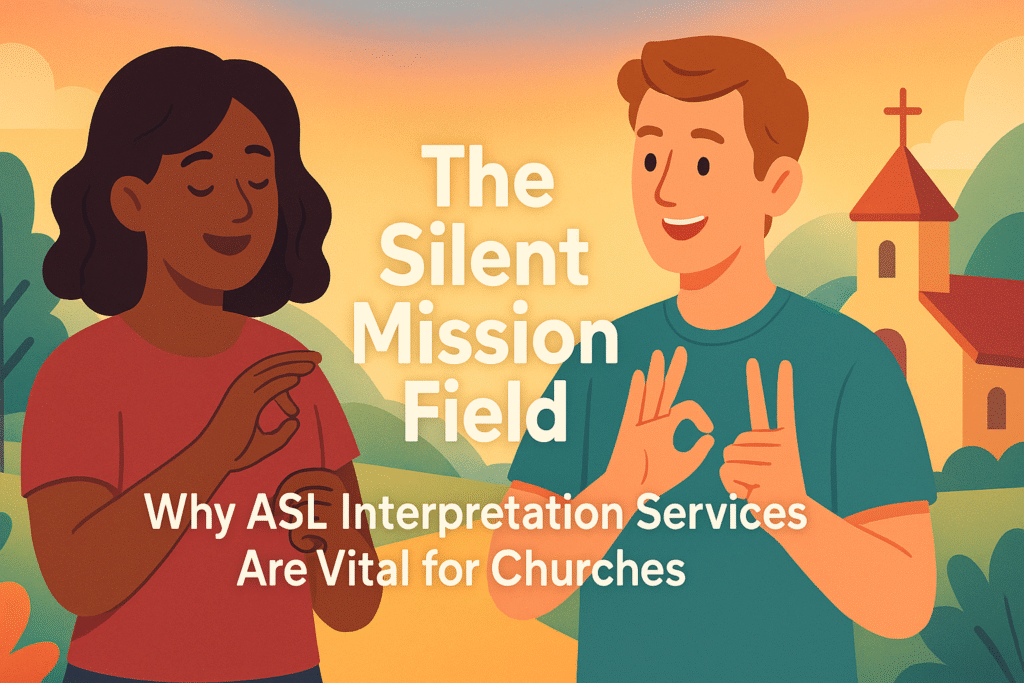When churches talk about missions, we often picture faraway nations, Bible translation projects, or Christian media reaching new countries. But what if one of the most overlooked mission fields is sitting quietly in our pews every Sunday?
The Deaf community is sometimes called the “silent mission field.” Not because they lack faith or desire to worship, but because many cannot access the message without interpretation. Globally, an estimated 70 million people use sign languages as their primary language, yet fewer than 2% of Deaf people are Christians.
Imagine being present in a church service, seeing the preacher’s passion, watching the congregation worship, but not being able to understand a single word. For many Deaf believers, that’s the weekly reality. ASL interpretation services are not just an add-on to ministry, they are a lifeline for discipleship and belonging.
Why ASL Interpretation Services Matter
Meeting a Spiritual and Emotional Need
The Bible is full of verses that remind us that God’s Word is for all people. In Romans 10:17, Paul writes, “Faith comes from hearing, and hearing through the word of Christ.” For the Deaf community, “hearing” happens visually—through sign language. By providing church interpreter services, congregations make this truth tangible and accessible.
The Transformative Benefits of ASL in Churches
1. Spiritual Growth and Discipleship
Deaf believers cannot fully engage in discipleship if they miss the teaching. With ASL interpretation, sermons, small groups, and Bible studies become accessible. One pastor we worked with said their church started providing ASL only for Sunday services, but when Deaf members asked for Bible study access, it pushed them to expand. Within a year, several Deaf members were leading their own study groups with interpreter support.
2. Evangelism and Outreach
Think about how we use Christian translation services for books, podcasts, or radio to reach across borders. ASL interpretation works the same way, but for an overlooked local mission field. Churches that provide ASL interpretation services often discover new visitors, families, and individuals who were searching for a place where they could fully participate.
3. Inclusion Builds Stronger Communities
When Deaf members are fully included, it changes the culture of the church. Children grow up seeing accessibility modeled. Hearing members learn to value diversity. Some even begin learning basic sign language to connect with Deaf friends. Inclusion becomes contagious.
Practical Steps to Start ASL Interpretation in Your Church
Step 1: Assess the Need and Show Openness
Sometimes churches hesitate, thinking, “We don’t have any Deaf members.” However, Deaf families often do not attend because no interpretation is available. By announcing that you provide ASL interpretation services, you create a welcoming invitation.
Step 2: Work With Professional, Faith-Sensitive Interpreters
Not every interpreter is equipped for ministry settings. Just as you wouldn’t use a secular translator for a theological book, churches need interpreters who understand both language and faith. Agencies like Christian Lingua help connect ministries with interpreters who are accurate, clear, and spiritually sensitive.
Step 3: Invest Consistently, Not Occasionally
One of the biggest mistakes churches make is offering interpretation once or twice a month. For Deaf believers, consistency matters. Worship is not a special event—it’s a weekly rhythm. Make ASL interpretation services part of your church’s DNA, not just a side project.
Step 4: Train the Congregation
Encourage church members to learn simple signs, such as greetings, “God bless you,” or “amen.” Small steps foster deeper community and show Deaf members that they’re truly part of the body.
Beyond Sunday: Expanding Access Through Technology
- Livestream Services: Add an ASL interpreter video window so Deaf viewers can follow online.
- Bible Studies: Record or stream with sign language interpretation.
- Youth Ministry: Provide interpreters for camps and conferences.
- Christian Media: Integrate voice-over services, subtitles, and sign language to make videos accessible.
One church in Texas reported that after adding ASL to their livestreams, they began receiving messages from Deaf viewers across the U.S. asking about discipleship resources. What started as a local step turned into a digital mission field.
Partnering to Reach Every Heart Language
At Christian Lingua, we believe every believer deserves to experience God’s Word in their own heart language, whether that’s written in a book, spoken in a sermon, or signed through ASL.
That’s why we provide not only Christian translation services for books, sermons, and media, but also ASL interpretation services tailored for churches worldwide.
If your church is ready to take this next step in inclusivity and outreach, let’s work together. With the right interpreters and strategy, you can open the doors of your ministry wider than ever before.
Contact Christian Lingua today to explore how ASL interpretation, church translation services, and Christian media translation can help your ministry fulfill the Great Commission right in your own sanctuary.
